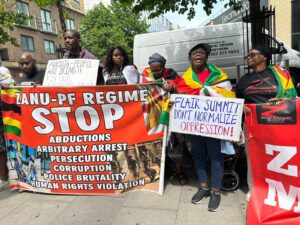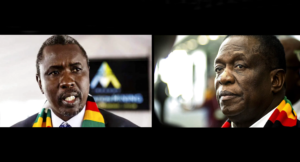MNANGAGWA’S POWER PLANS: THE ROAD TO 2030 AND BEYOND

President Emmerson Mnangagwa is moving to extend his time in power beyond the constitutional two-term limit. Justice Minister Ziyambi Ziyambi has begun the process to make this happen through changes in the law. This comes even though Mnangagwa has denied wanting to stay in power and once called himself a “constitutionalist.” He became president through a coup in November 2017.
The goal is to extend his rule from 2028 to 2030 or even further. This follows a Zanu PF conference held last October in Bulawayo. At the meeting, the party resolved that Mnangagwa could stay in power if he chose to. However, the resolution admitted that this would be very difficult to achieve.
In an interview with The Sunday Mail, a state-run newspaper, Ziyambi explained how this process works. He said resolutions from the Zanu PF conference come from a bottom-up approach. According to him, people at the grassroots level suggest changes, which are then discussed at the district and provincial levels before they are finalized. Once the resolutions are adopted, government ministries are tasked with implementing them.
Ziyambi said each ministry receives instructions on what needs to be done. These ministries will then work on implementing the resolutions. If the resolutions need changes to the law, the ministries will start the legal process to make this happen.
To extend Mnangagwa’s rule, the process will involve changes to the constitution. Ziyambi said the amendment would require approval through two referenda. He explained that the process begins with government departments creating principles for the proposed change. These principles are then sent to Cabinet for discussion and approval. After that, the Attorney-General’s office will draft a Bill. This draft will be based on consultations with people across the country.
Once the draft is ready, it will go back to the Cabinet Committee on Legislation for review. Then it will be sent to Parliament, where it will be gazetted and debated. According to Ziyambi, this is the usual process for amending laws in Zimbabwe.
Ziyambi admitted that this amendment is not straightforward. He said: “The actual processes will be clear once the Bill is available, so I cannot pre-empt a process that requires several approvals by articulating exactly how this will be done. But yes, the will of the people will be given effect through the necessary amendments.”
The Justice Minister emphasized that the resolutions are not made by individuals but by collective agreement. He explained that they reflect what the people want. He also said the resolutions are an important part of how the government plans its policies.
If successful, this constitutional change will allow Mnangagwa to extend his rule well beyond his current term. However, it remains to be seen how this process will unfold. The plan faces significant legal and political challenges, and not everyone agrees with it.
The question of whether Mnangagwa’s extended rule truly reflects the will of the people is also likely to come under scrutiny. While Ziyambi insists the process is guided by the grassroots, critics may argue that it is being driven by political elites seeking to maintain power.
Mnangagwa’s journey to extend his rule could reshape Zimbabwe’s political future. It highlights how constitutional changes can be used to keep leaders in power, even when the rules seem to say otherwise. How the people of Zimbabwe respond to this process will also be an important part of the story. For now, the plan is in motion, and all eyes are on the next steps in this unfolding political drama.



